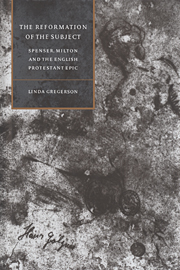Book contents
- Frontmatter
- Contents
- Acknowledgments
- Introduction
- 1 Emerging likeness: Spenser's mirror sequence of love
- 2 The closed image
- 3 Narcissus interrupted: specularity and the subject of the Tudor state
- 4 The mirror of romance
- 5 Fault lines: Milton's mirror of desire
- 6 Words made visible: the embodied rhetoric of Satan, Sin, and Death
- 7 Divine similitude: language in exile
- List of works cited
- Index
7 - Divine similitude: language in exile
Published online by Cambridge University Press: 08 October 2009
- Frontmatter
- Contents
- Acknowledgments
- Introduction
- 1 Emerging likeness: Spenser's mirror sequence of love
- 2 The closed image
- 3 Narcissus interrupted: specularity and the subject of the Tudor state
- 4 The mirror of romance
- 5 Fault lines: Milton's mirror of desire
- 6 Words made visible: the embodied rhetoric of Satan, Sin, and Death
- 7 Divine similitude: language in exile
- List of works cited
- Index
Summary
Translation and the Fall
John Milton and Samuel Shaw were not the only masters of eloquence in Reformation England to contemplate and comment upon the problematic relations of language to the dispositions of worldly power. The rhetoricians and poets and educators of sixteenth- and seventeenth-century England varied considerably in the distribution of their political sympathies, personal ambitions, worldly disillusionment, transcendent and strategic hopefulness, but they shared one formidable premise: the infection of will and faith and meaning whose etiology Milton traces under the rubric of Satanic rhetoric was not, as they discerned it, an infection that was liable to quarantine. It was not a series of discrete abuses of which rhetorical practice might be purged; it was part of the very fabric of postlapsarian cognition. Language was a gift of God, the very gift in which human beings “passe all other creatures liuing,” and yet it was also the sign of human distance from direct apprehension of divinity. Language was at once a symptom of the Fall and its only plausible remedy, the reiterative trace of providential history and of the transgression with which history began, the instrument by which humans know (and make) their place in the created world. Language was the mirror in which the creature might behold his likeness and take the measure of exile.
- Type
- Chapter
- Information
- The Reformation of the SubjectSpenser, Milton, and the English Protestant Epic, pp. 231 - 262Publisher: Cambridge University PressPrint publication year: 1995



